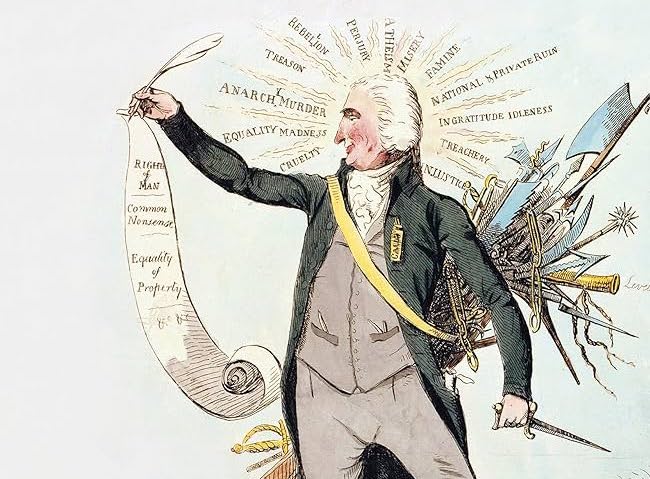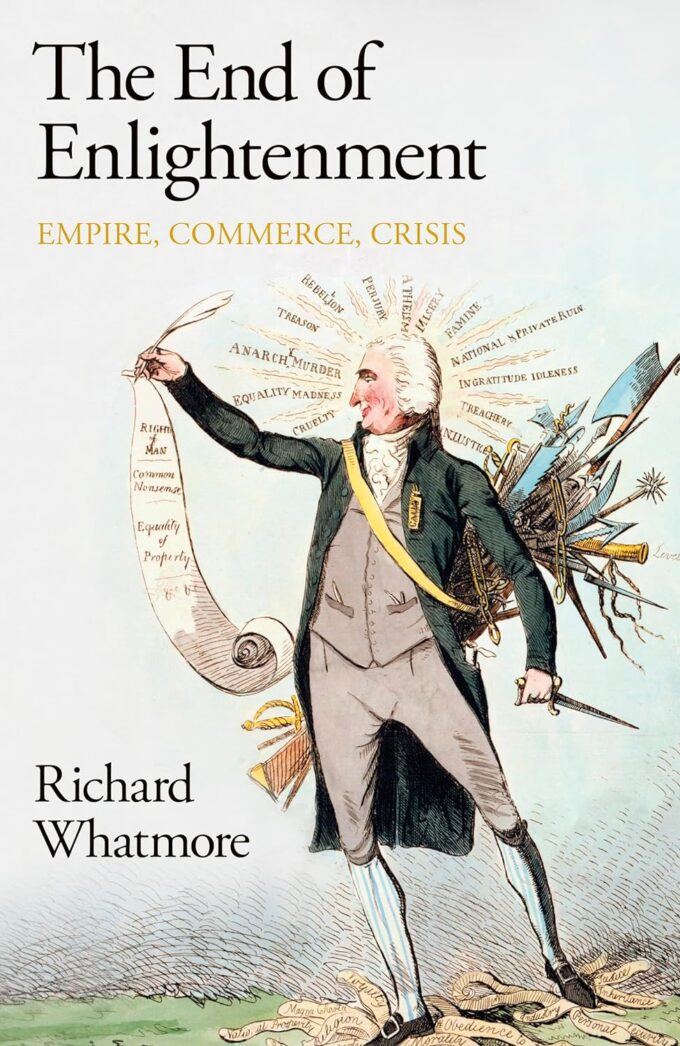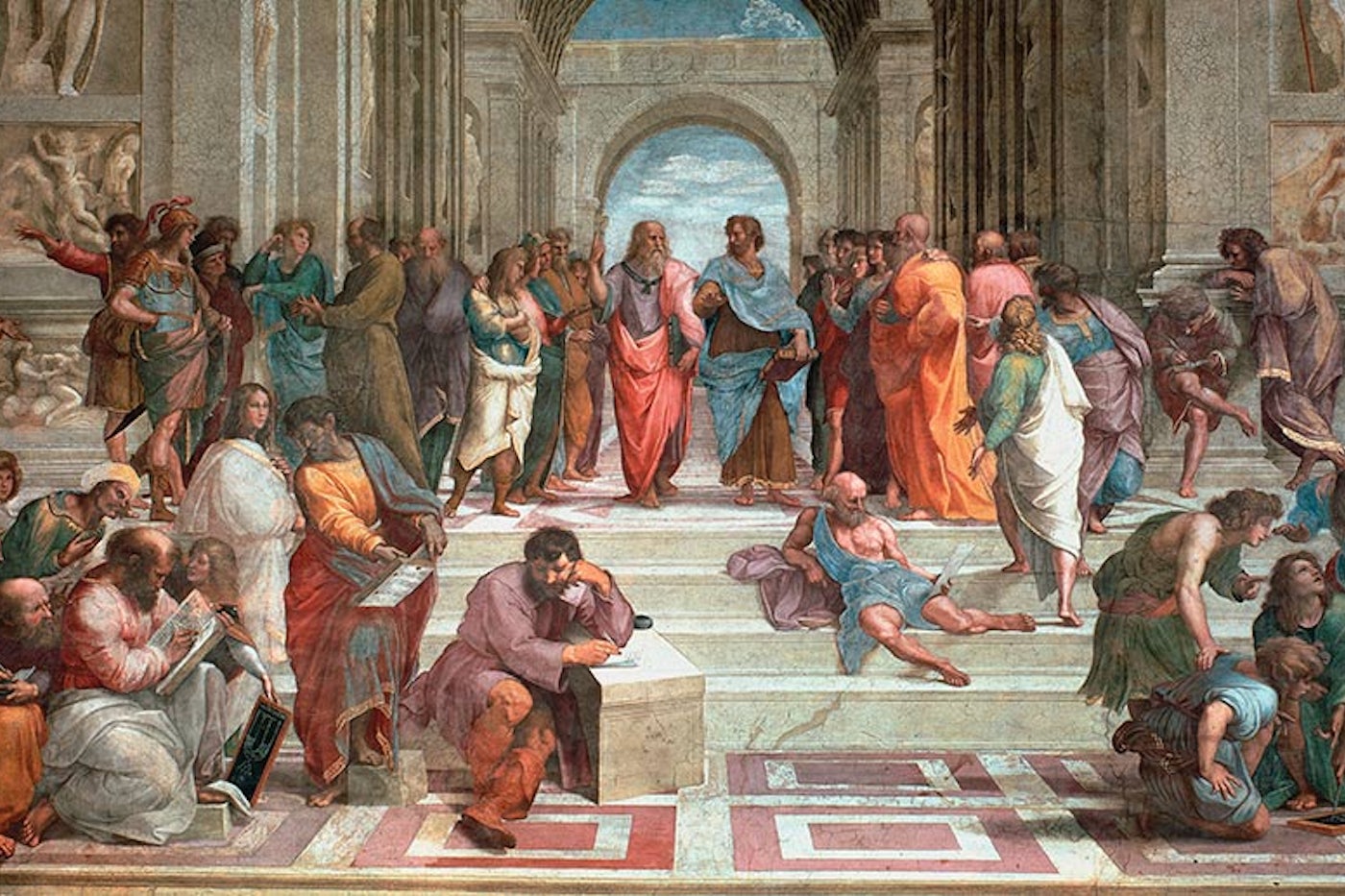FEBRUARY 2, 2024

Cover Art for the book The End of Enlightenment: Empire, Commerce, Crisis by Richard Whatmore
In this interview, exclusive for CounterPunch, Richard Whatmore discusses his latest book, The End of Enlightenment: Empire, Commerce, Crisis (Penguin, 2023). In a world that demands highly rational planning to abolish empire and combat the manifest exploitation of a capitalist society, Whatmore emphasizes that the left needs to sustain the critique of fanatical economic practices. Thinkers and writers of the 18th century like Phillis Wheatley, Thomas Paine, and Mary Wollstonecraft would find the idea of self-regulating markets to be absurd. Whatmore reminds the reader that “contemporaries saw commerce as an anarchic force, turning social relations and relations between states upside down.” Further, he indicates that, “During the end of enlightenment era, historical actors were certain that the world had to change – what existed could not be sustained – and they lost all faith in contemporary ideological solutions to the problems they faced. They sound like us.”
Daniel Falcone: Political Scientist Camila Vergara recently stated, “I got my copy of Richard Whatmore’s The End of Enlightenment, which offers a radical re-evaluation of the Enlightenment as a failed project due to the pursuit of wealth & empire. Timely critical approach to Western values, and a research treasure with more than 100 pages worth of useful notes.” I was pleased to see such an enthusiastic endorsement of your thesis. Could you elaborate on your main arguments and the purpose of the book?
Richard Whatmore: Praise from somebody I respect as much as Camila Vergara is very welcome indeed. I will try and explain the central argument of the book; it is that we have come to a point in time where most of us, including scholars of course, use the term ‘the Enlightenment’ loosely and imprecisely. One of the goals of the book is to return to 18th century conceptions of Enlightenment. I think that in the 18th century contemporaries were obsessed with avoiding wars of religion; their parents and grandparents would have had direct experience of the consequences of religious warfare and here there is a parallel to the generations which experienced world war in the 20th century, shaping subsequent political identities for several generations.
My argument is that any strategy to prevent religious warfare from breaking out amounted to an Enlightenment. So, there were multiple enlightenments, all intended to prevent religious violence, itself associated with superstition and fanaticism, from causing societal chaos. An important point is that stopping religious fanaticism might entail autocracy, controlling the thoughts and behaviour of persons living in a particular community or state. Such strategies have been called at different times Enlightened Despotism by historians.
But the more interesting relationship that developed during the 18th century was that between enlightenment and free states. Free states, it is vital to recognise, were in decline. Republics had become endangered species and republicanism as an ideology was on the wane. The most significant free state was Britain, which Montesquieu called the freest state in human history and a republic hiding beneath the form of a monarchy. Numerous commentators in the 18th century thought that Britain too was on the edge of a precipice and likely to collapse as a free state. British politics were seen to be corrupt; the population was increasingly self-interested or addicted to luxury, and politicians were becoming the servants of merchants and bankers seeking legislation to guarantee them vast profits through the establishment of commercial empires.
The public good was ignored or betrayed. For these reasons, Britain was not expected to survive. The End of Enlightenment tells the story of the attempt by figures such as Edmund Burke, Edward Gibbon, Catharine Macaulay, Thomas Paine, and Mary Wollstonecraft to save liberty and enlightenment together. They all, for differing reasons, saw themselves to have failed. But the strategies they employed are significant and remain so; some of the problems they addressed have not gone away.
Daniel Falcone: How is the book organized and what does it add to the historiographic account of Enlightenment scholarship?
Richard Whatmore: The book begins with David Hume because Hume was one of the figures who believed in the reality of enlightenment. He was certain that his own times merited congratulation because wars of religion had once more been close and had been prevented from breaking out. The example Hume gave was the French monarch Louis XIV, who with the Revocation of the Edict of Nantes had revived counter-reformation Catholicism in all its evangelism and intolerance. Yet Louis XIV, rather than establishing universal monarchy on mainland Europe, was ultimately defeated militarily and Europe was not ravaged again by theological conflict turned violent. At his most optimistic, in the 1740s, David Hume thought that major states such as Britain and France would come together as what he termed ‘governments of laws rather than of men’, establishing ‘civilised monarchies’.
By the 1760s Hume’s optimism was gone. He became convinced that Britain’s addiction to public credit and commercial empire had ruined politics. Politicians were becoming servants of rich merchants, as in the case of the malign domestic consequences of the influx of wealth via the East India Company. Equally worrying for Hume was that ordinary people, especially in London, were turning xenophobic and fanatic in their lust for liberty. After explaining Hume’s change of opinion, The End of Enlightenment describes responses to Hume from figures as different as the republican revolutionary Jacques-Pierre Brissot and the Swiss-loving historian Edward Gibbon.
Daniel Falcone: I noticed that David Graeber’s posthumous work on Pirate Enlightenment where he considers how “proto-democratic practices” of Madagascar’s Zana-Malata people formed an Enlightenment adjacent project thought too long as something distinctly Euro-centric. He argued that the recoveries of non-western thought can expand our understanding of Enlightenment. More recently, Surya Parekh, authored Black Enlightenment to stretch the orthodoxy and discourse to include black authors and the race anxiety felt by European thinkers. Can you comment on how works like this impact, or relate to, you own revisionist work on the subject?
Richard Whatmore: Alas but David Graeber, brilliant though much of his work unquestionably was, had no knowledge of the history of political and economic thought in relation to the Enlightenment. He made the same mistake as many authors who want to use the late 17th/early 18th centuries as a source for utopian ideas in the present and in the process unfortunately gets the past completely wrong. There may have been practices in Madagascar that Graeber wanted to call ‘proto democratic’, but I would be careful about defining ‘democracy’ in such a way, redolent of what used to be called Whig history.
What I like about so many eighteenth-century authors is that they take ideas in action seriously. If you want to propose an idea in the past for use in the present, then you need to establish a clear alternative future for the present and a transition mechanism that gets us from the existing state of things to that alternative future. Above all, you need to identify ideas that tend to thrive, rather than only working in specific circumstances or being like endangered species going the way of the dodo. For example, if your republic keeps getting taken over by Caesar figures or republican generals like Bonaparte, you need to have a precise plan to deal with it. If you fail to do this then you are simply saying ‘wouldn’t it be great if we could live like they do’. Alas, it is very hard to change your culture and society without violent revolution, but they try exactly this with precise plans during the period I call The End of Enlightenment.
I want to make a further point that arises from Graeber’s approach. For me, you cannot link democracy in the past to democracy in conditions of commercial empire in the 18th century. The latter conditions largely subsist today in the sense we are still governed by commercial empires, even if we think we live in sovereign states or are free peoples. In the 18th century it was advisable only to draw parallels when experiences were sufficiently connected so that lessons could be learned directly. Distance or difference translated into irrelevance. In the case of the American Revolution, for example, revolutionary experience was not deemed relevant to radical politics in Europe because of the surfeit of land in America taken from the indigenous peoples. In short, in the governance of the United States, you could throw land at a problem. In Europe there was no spare land to throw and therefore American politics was entirely divorced from European circumstances as to lack imaginative purchase for reformers.
The history of democracy, which used to be called the history of free states, has always been difficult. The story relayed in The End of Enlightenment remains significant because something happened that led to free states being the dominant form of state in modern times while also making so many people dissatisfied with this reality. What happened is that, altogether unexpectedly, Britain survived the eighteenth century. Indeed, Britain free states across the world, especially in Europe and South America, began to model themselves on Britain after the Napoleonic Wars. This was depressing for reformers because Britain remained what Adam Smith called a mercantile system with a corrupt economy giving too great a political voice to merchants and bankers. Worse still, socialist, or other utopian alternatives of the time faced the problem that the French Revolution had descended into Terror, failing to create a stable republic, and ultimately collapsing into the First French Empire, that restored the power of church and aristocracy vanquished in 1789.
Some observers saw the French revolutionaries to be replicating the history of radical Protestantism, creating a republican church which divided and then turned violent, establishing two separate churches which then repeated the process over and over. Recovering the history of democracy and free states, we must return to the history of Britain and its commercial empire. As Tocqueville said about the atrocities committed by the French in Algeria, he hated them at the same time as he considered them to be necessary, because France would not otherwise survive as a great state. He could see no alternative for France, no alternative future. This was why the work he never finished concerned the British in India. The tragedy of modernity was that the free state of Britain was better at war than any free state historically.
Commercial empires historically, Carthage or the Dutch Republic, have risen meteorically and then fallen to earth. Britain was different. It survived as a form of free state, but with a mercantile economy geared to empire and profit whatever the consequences for peoples in, say, Ireland or Bengal. All of this means that the circumstances and admirable distinctiveness of the Zana Malata people has very little to teach us about politics or the economy in the present, although worth relating.
Turning to Parekh’s Black Enlightenment, one of the consequences of the establishment of commercial empire was, as we all know, racism, war and grotesque violence justified by the pursuit of profit. An attempt was made in the 1780s to abolish empire, turning the entire globe into (small) communities of pacific free states. I am interested in ideas that contemporaries felt directly solved problems and how they changed their views after their ideas were perceived to have failed. Strategies for enlightenment had to face the problem that the combination of Britain as a free state with commercial empire seemed to be fostering fanaticism everywhere, including fanatic ideas about liberty turning xenophobic. Enlightenment ended because contemporaries felt they had not solved these problems. I do not think we have either.
Daniel Falcone: Why is it important to see The Enlightenment as something that changes in meaning historically? How can it?
Richard Whatmore: I hope it is clear from The End of Enlightenment that if you define enlightenment as any strategy intended to prevent fanaticism and superstition from breaking out there are both multiple enlightenments and issues concerning the relationship between a particular enlightenment and, for example, liberty, equality, and commerce. Enlightenment was different in distinct contexts. Montesquieu’s view was correct that strategies for enlightenment in one set of circumstances had to be utterly different to enlightenment in an alternative context. Strategies had to be different if reform was going to be successful in one place rather than in another. The rise of Britain as a free state and the attempt to create a new kind of Republic during the French Revolution led to what I call the end of enlightenment; wars of religion broke out in secular guise. Maintaining enlightenment became much more difficult.
Whether you were a republican, monarchist, ancient or a modern, everyone considered themselves to have failed. The 18th century ended with a war to the death between the newly free state of France and Britain. The French Republic put an end to the liberty of historic republics from the Swiss cantons to the Dutch Republic and independent republics such as Venice Genoa and Geneva. If you loved liberty, the choice appeared to be between a grotesque commercial empire sustained by corrupt trade with a xenophobic populace or fanatic French republicanism likely to descend into war-driven empire. During the end of enlightenment era historical actors were certain that the world had to change – what existed could not be sustained – and they lost all faith in contemporary ideological solutions to the problems they faced. They sound like us.
Daniel Falcone: Is there room, in your opinion, for interpretations of the Enlightenment to be firmly rooted in leftist opposition to abuses set forth by organized capital? For example, Noam Chomsky reads the Enlightenment as such.
Richard Whatmore: Noam Chomsky says that the defenders of enlightenment were anarchists, giving the example of the division of labor and its effects in making individuals lead meaningless lives characterized by what was later called alienation (Adam Smith famously makes the point without using the term). Although there is little point in seeking the origins of anarchist philosophy in the eighteenth century, Chomsky does recognize that contemporaries saw commerce as an anarchic force, turning social relations and relations between states upside down. What we have recently experienced and may be surprised at today – the rapid rise of China so soon after declarations were made at the turn of the century that the United States could be expected to be the sole global superpower – would not have surprised observers of trade in the enlightenment era. Rich countries became poor, and poor became rich, meaning that neither international relations nor domestic politics could be expected ever to be stable in conditions of the commercialization of societies. I think that it is accurate to draw parallels between portrayals of the effects of John Law’s Mississippi scheme (and the resulting South Sea Bubble), for example, and Chomsky’s description of capitalism. When Adam Smith coins the term ‘mercantile system’ to describe cabals of merchants bribing politicians to pass legislation for their profit against the public interest, I think this too is an origin point for many subsequent critiques of Britain’s version of commercial society. And it was natural in the eighteenth century to rail against private corruption in the provision of state-funded products, with self-enrichment rife from the dockyards to the army to tax collection. In a sense then, we still live in their world and I’ve no doubt that they would find the notion of self-regulating markets to be ridiculous.
I think what we have lost, and the left has lost, is the critique of certain economic practices as fanatic, being the equivalent of unleashing religious warfare upon the world. Enlightenment fears about wars of religion breaking out anew, I’ve argued, encompassed tyrants and liberty, commerce and poverty, democracy, and empire. Avoiding a world where religious fanatics rule was the core enlightenment goal, and by the end of the century, almost all the luminaries see themselves to have failed. The world was ruled by empire-builders, warmongers, money men and crooked politicians, in addition to being buffeted by the establishment of new churches both secular and religious. The eighteenth century is full of projects to abolish commerce, create purely agricultural societies and closed commercial states.
But there are also highly practical schemes to abolish empire and combat the manifest evils of commercial society, for example by establishing moderate wealth everywhere. I suppose what I’m saying is that their critiques of organized capital – for example, they would never have contemplated the control of domestic politics by individuals who had no stake in the state, being able to liquidate their assets and move across borders at a time of crisis – are even richer than the Chomskyan perspective.
Daniel Falcone is a teacher, journalist, and PhD student in the World History program at St. John’s University in Jamaica, NY as well as a member of the Democratic Socialists of America. He resides in New York City.

 Theodor W. Adorno (1903-1969) was a German philosopher, sociologist, psychologist, and a classically trained pianist and composer. An only child to Maria Calvelli-Adorno della Piana (a devout Catholic from Corsica and former professional singer) and Oscar Alexander Wiesengrund (an assimilated Jew who had converted to Protestantism and a successful wine-export businessman), his childhood was marked by a love (and wunderkind proficiency) for music and a growing tendency toward intellectual nonconformism.
Theodor W. Adorno (1903-1969) was a German philosopher, sociologist, psychologist, and a classically trained pianist and composer. An only child to Maria Calvelli-Adorno della Piana (a devout Catholic from Corsica and former professional singer) and Oscar Alexander Wiesengrund (an assimilated Jew who had converted to Protestantism and a successful wine-export businessman), his childhood was marked by a love (and wunderkind proficiency) for music and a growing tendency toward intellectual nonconformism. However, contrary to what he saw as a vacuous, useless culture in 20th century America, Adorno was an ardent believer in the radical transformative power of art.
However, contrary to what he saw as a vacuous, useless culture in 20th century America, Adorno was an ardent believer in the radical transformative power of art.  In Dialectic of Enlightenment (written with Max Horkheimer) Adorno argues that the horrors of the twentieth century were not a bug in the liberal system, but a rational end. As they write in the opening paragraph: “the fully enlightened earth radiates disaster triumphant.” If the ideas of the enlightenment took hold across Europe why did Europe descend into fascism and violence?
In Dialectic of Enlightenment (written with Max Horkheimer) Adorno argues that the horrors of the twentieth century were not a bug in the liberal system, but a rational end. As they write in the opening paragraph: “the fully enlightened earth radiates disaster triumphant.” If the ideas of the enlightenment took hold across Europe why did Europe descend into fascism and violence?
 Adorno and Horkheimer are most definitely not advocating a return to the past, nor do they romanticize the premodern world. This is why they apply their dialectical method of myth and enlightenment containing each other – ancient ways of understanding contained useful reflections on meaning, truth, and morality which contemporary society appears to lack, while the enlightenment contained the ability to turn matters of historical contingency or human relations into matters of fate.
Adorno and Horkheimer are most definitely not advocating a return to the past, nor do they romanticize the premodern world. This is why they apply their dialectical method of myth and enlightenment containing each other – ancient ways of understanding contained useful reflections on meaning, truth, and morality which contemporary society appears to lack, while the enlightenment contained the ability to turn matters of historical contingency or human relations into matters of fate.

